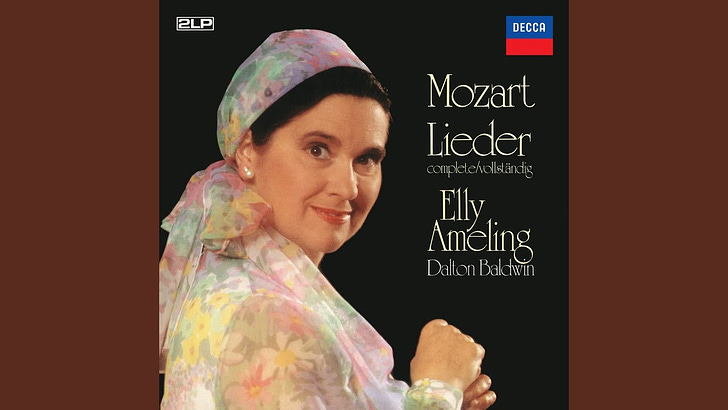In my M.M. recital many years ago, I sang a group of Mozart lieder. As I recall, I programmed two of the most famous — “An Chloë” and “Abendempfindung an Laura” — but needed something less demanding, for both myself and the audience, to round out the set. My teacher recommended the song “Verdankt sei es dem Glanz,” performed in the video above by Dutch soprano Elly Ameling.
I was meticulous about translating every word of my repertoire. I had studied languages as an undergraduate with great diligence because I wanted to understand why composers set each word to each note and chord: in the compressed economy of the art song, the singer’s connection to the marriage of text and music conveys meaning in ways that are both intimate and profound, and I longed to do that. But the text of “Verdankt sei es” stumped me.
Years later — I’m not sure how or why — I’ve found myself ruminating over the song. I found a recent translation into English by the important translator Richard Stokes:
Back when I sang it, I was a young woman, and littleness and humility failed to resonate for me. I assumed Mozart’s text was some idiomatic 18th-century Masonic trope that I could never fully understand, so I stuck the song in the middle of the Mozart set in my recital more or less as filler. “Verdankt sei es” was strophic, and sort of cute and cheery, and I felt I could put it across on that basis.
It is interesting to me now that what I long ago translated as “circle” (Zirkel), Richard Stokes renders more metaphorically as “sphere,” and what I translated as “circles” (Kreise), Stokes gives as “class.” Der Großen, or so I believed at the time, referred to God, but Stokes (a far better translator than I) suggests that “the Great” are, more realistically, one’s social, intellectual, or spiritual superiors.
Johann Timotheus Hermes (1738-1821)
In the liner notes for his recording of what might be called “proto-lieder,” Song’s First Cycle, the Irish tenor Robin Tritschler writes about “Verdankt sei es”:
Mozart composed [this song] between August 1781 and May 1782. The text [is an interpolation] from the popular sentimental novel Sophiens Reise von Memel nach Sachsen [Sophie’s Journey from Memel to Saxony] by Johann Timotheus Hermes. In Verdankt sei es dem Glanz der Großen the relationship between heavenly and earthly beings, between modesty and self awareness, is treated with complete assurance; there is no shame in being small and insignificant in the Universe.
Robin Tritschler’s version of the song
So we are given to understand, by Mozart and Hermes, that there is no shame in littleness. This is a lesson so difficult to learn that I’ve spent my lifetime on it.
For what does the presence of the masses on social media suggest, if not a bid for momentary greatness? I offer up my attractive images, as well as my opinions, my clever commentary, and my ostensibly innermost thoughts, in a plea for relevance and even love. But Mozart and Hermes caution otherwise. The former’s tremendously simple setting of the latter’s self-effacing text is symbolic, in itself, of the virtues of insignificance and imperceptibility.
As “Verdankt sei es” has been humming away as the background soundtrack of my recent days, I have read a number of interesting things, including an essay about miscarriage by Emily Hancock:
The void I’ve been made keeper of has been filled six times now. Divide that by two and you get the amount of humans I’m responsible for. Six divided by two equals three. Three unaccounted for. Equals again. Equals what, exactly? In all cases, a life. A life lived or not is still a life. And I have been home to six lives.
A life lived or not is still a life. This is a striking and harrowing thought.
A day before reading Hancock’s testimony, I had puzzled over an essay in The New York Review of Books by abortion doctor Christine Henneberg on the book Undue Burden: Life and Death Decisions in Post-Roe America, which seemed to elide Hancock’s thesis:
It is immediately and refreshingly apparent in Luthra’s reporting that she is uninterested in questions of prevention. . . . Few of Luthra’s interview subjects mention—or Luthra chooses not to emphasize—the use of birth control. Again and again they encounter pregnancy as a surprise, even when it’s not their first. In Texas in April 2023, twenty-nine-year-old Kaleigh, who’d had an abortion once before, was nauseated, and her period was “weeks late”—but when her pregnancy test came back positive, “it felt like a gut punch.” Kelly, a twenty-six-year-old in Houston, tells Luthra that she felt her “heart sink” at the positive test. She’d had an abortion just seven months earlier.
After a few stories like this, questions about prevention might begin to nag at even the most sympathetic reader. If she wasn’t doing anything to prevent pregnancy, how could she be so surprised? And why wasn’t she more careful? It’s a culturally primed response that leans heavily on the idea that individuals—specifically, those who can become pregnant—are the ones responsible for preventing unintended pregnancies. But as I often tell my patients, “It takes two people, minimum, to make an unintended pregnancy.” Other responsible parties include politicians who legislate abstinence-only sex education in schools, a health care system that creates enormous gaps in birth control coverage, and a patriarchal society that aids and abets intimate partner violence and reproductive coercion.
Dr. Henneberg deems it “refreshing” to extrapolate the blame for unintended pregnancy beyond mother and father and onto a bureaucracy that is at once faceless, soulless, and ubiquitous. This seems like a dangerous abrogation of human agency.
She concludes:
It is up to the reader to ask whether we can summon . . . sympathy for anyone seeking an abortion—without knowing their reasons, without asking whether they were using birth control or whether they plan to use it in the future. . . .When we trust anyone who is pregnant to make such a complex and personal decision for themselves, then we—politicians, health care providers, all of us—have to accept that they don’t owe us any explanation.
I completely agree with Henneberg that no one owes die Großen (a group with whom she apparently self-identifies) an explanation of their choices or behavior. My surprise was that the generally progressive New York Review of Books would endorse such an amoral libertarian argument. As she relates about “Jasper,” a pregnant woman who presents as a trans man seeking an abortion (Jasper mistakenly believed that testosterone injections were an effective form of contraception):
At moments during the harried and emotional process of scheduling his abortion, Jasper finds himself imagining that “he would give birth to a healthy baby, that he’d be able to do a good job being a dad.” He describes to Luthra the feeling that “his body wanted to protect the being that was growing inside him, which he’d begun to think of as a baby.” It is a tender ambivalence I often see in my own patients, who can struggle visibly with the meaning and value of the pregnancy inside them, even as they affirm their decision to end it. Jasper’s case is in this regard quite typical, even unremarkable—and in some ways the most instructive of all of Luthra’s examples. He is a person with a uterus who is pregnant and doesn’t want to be. This is the one common story beneath all abortion stories—and yet it can be the hardest story to accept.
Jasper had begun to think of “the being that was growing inside him . . . as a baby.” Henneberg implies that Jasper’s ascription of aliveness to this being, however, is misinformed, a coping mechanism. Henneberg, after all, is one of die Großen, and the patients, female and self-identified male — an identification that is in itself a sign of deep tribulation — seeking abortions are the insignificant. Desperation, loneliness, poverty, and instability are not natural states for die Großen, and in their mercy and compassion they perform abortions on those who are insignificant.
Die Großen apparently lack the imagination that would make a better way possible, a world in which the insignificant and their even more insignificant babies might be counted as lives — lives that might be allowed to continue without shame.






Well said!